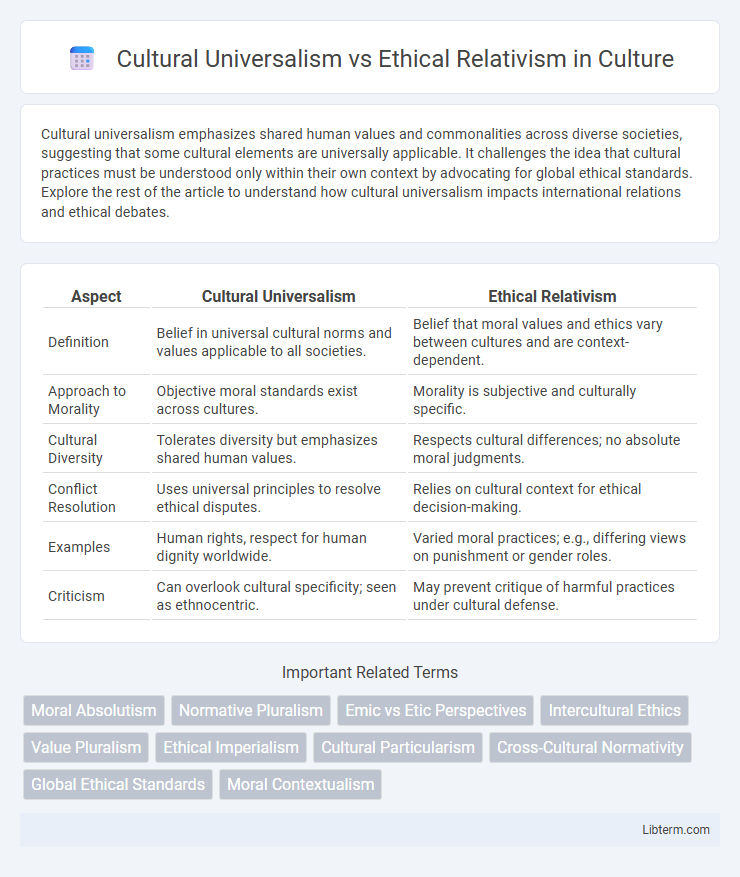Cultural universalism emphasizes shared human values and commonalities across diverse societies, suggesting that some cultural elements are universally applicable. It challenges the idea that cultural practices must be understood only within their own context by advocating for global ethical standards. Explore the rest of the article to understand how cultural universalism impacts international relations and ethical debates.
Table of Comparison
| Aspect | Cultural Universalism | Ethical Relativism |
|---|---|---|
| Definition | Belief in universal cultural norms and values applicable to all societies. | Belief that moral values and ethics vary between cultures and are context-dependent. |
| Approach to Morality | Objective moral standards exist across cultures. | Morality is subjective and culturally specific. |
| Cultural Diversity | Tolerates diversity but emphasizes shared human values. | Respects cultural differences; no absolute moral judgments. |
| Conflict Resolution | Uses universal principles to resolve ethical disputes. | Relies on cultural context for ethical decision-making. |
| Examples | Human rights, respect for human dignity worldwide. | Varied moral practices; e.g., differing views on punishment or gender roles. |
| Criticism | Can overlook cultural specificity; seen as ethnocentric. | May prevent critique of harmful practices under cultural defense. |
Introduction to Cultural Universalism and Ethical Relativism
Cultural universalism posits that certain cultural values and ethical principles are globally applicable regardless of individual cultural differences. Ethical relativism challenges this view by asserting that moral standards and values are culturally dependent and vary across societies. The debate between these perspectives shapes discussions on human rights, ethical norms, and cross-cultural understanding.
Defining Cultural Universalism: Core Concepts
Cultural Universalism asserts that certain ethical principles and human rights are universally applicable across all cultures, grounded in shared human nature and common moral values. Core concepts include the inherent dignity of individuals, fundamental freedoms, and basic rights that transcend cultural differences. This perspective promotes global standards for justice and morality while recognizing cultural expressions that do not violate universal ethical norms.
Understanding Ethical Relativism: Key Principles
Ethical relativism asserts that moral standards and values are culturally dependent and vary across societies, rejecting the existence of absolute ethical norms. This perspective emphasizes the importance of context and cultural background in interpreting what is considered right or wrong, promoting tolerance and respect for diverse ethical systems. Key principles include the recognition that no single set of ethics is universally valid and that moral judgments should be understood relative to specific cultural frameworks.
Historical Evolution of Moral Frameworks
The historical evolution of moral frameworks reveals a dynamic interplay between cultural universalism and ethical relativism, with early societies often exhibiting localized norms that gradually encountered broader universal principles through intercultural contact and globalization. Enlightenment thinkers advanced cultural universalism by positing inherent human rights and moral laws applicable across societies, contrasting with ethical relativism's emphasis on context-specific values rooted in distinct cultural traditions. Contemporary moral philosophy increasingly navigates this tension, recognizing the importance of universal human dignity while respecting cultural diversity and ethical pluralism derived from historical experiences and social transformations.
Major Arguments Supporting Cultural Universalism
Cultural universalism asserts that certain ethical principles, such as human rights and justice, are universally applicable regardless of cultural differences. Proponents argue that shared human experiences and needs justify common moral standards that transcend cultural diversity. Empirical evidence from cross-cultural studies demonstrates consistent values like fairness and harm avoidance, supporting the idea of universality in ethics.
Core Justifications for Ethical Relativism
Ethical relativism is primarily justified by its emphasis on cultural diversity and the belief that moral principles are not absolute but vary according to cultural contexts. It argues that what is considered morally right or wrong depends on societal norms, historical background, and collective values, rejecting universal moral standards. This perspective promotes tolerance and understanding by recognizing the legitimacy of different moral frameworks across cultures.
Case Studies: Application in Global Ethics
Case studies in global ethics reveal that cultural universalism advocates for applying consistent moral principles across diverse societies, as seen in human rights enforcement policies by the United Nations. In contrast, ethical relativism emphasizes respect for local customs and moral frameworks, illustrated by debates in international business ethics where companies adapt practices to fit cultural norms. Examining dilemmas such as child labor and gender equality showcases the tension between universal standards and cultural specificity in formulating ethical global policies.
Challenges and Critiques of Both Perspectives
Cultural universalism faces challenges for imposing rigid moral standards that may overlook important cultural differences and context, potentially leading to ethical imperialism. Ethical relativism is criticized for risking moral paralysis by denying universal norms, which can excuse harmful practices under cultural justification. Both perspectives struggle to balance respect for cultural diversity with the need for consistent ethical principles in global human rights discourse.
Impact on International Law and Human Rights
Cultural universalism advocates for the application of consistent human rights standards across all nations, influencing international law to enforce universally accepted protections regardless of cultural differences. Ethical relativism challenges this approach by emphasizing the importance of cultural context, leading to debates over the legitimacy and applicability of universal human rights norms in diverse societies. This tension impacts treaty negotiations, enforcement mechanisms, and the interpretation of human rights obligations, often complicating consensus in international legal frameworks.
Finding Common Ground: Towards Ethical Dialogue
Cultural universalism emphasizes shared moral principles applicable across societies, while ethical relativism asserts that moral norms are context-dependent and vary between cultures. Finding common ground involves recognizing universal human values, such as respect and justice, and engaging in open ethical dialogue that respects cultural diversity without imposing rigid standards. This approach fosters mutual understanding and collaborative problem-solving in global ethical discussions.
Cultural Universalism Infographic

 libterm.com
libterm.com